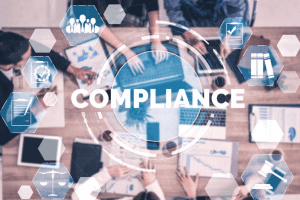Protect Your Business with a Comprehensive Approach to Privacy and Security Regulations
For many companies, compliance is nothing more than a nuisance—an annoying and often frustrating box that needs to be checked. But compliance isn’t just a list of demanding requirements that have to be met. In today’s complex cybersecurity world, compliance often equals safety, with new data security laws passing in multiple states and strengthened regulatory bodies flexing their muscles.
These extra requirements aren’t in place only to save face or increase red tape, either. Many recent compliance enhancements address very real breakdowns of privacy and security. These laws provide average Americans with a more comprehensive layer of protection—and, with proper protection and preparation, can even help modern businesses meet the evolving needs of today’s consumers.
What Exactly Does Compliance Mean?
Depending on the location of your business, the industry it operates in, and its size or scope, compliance can mean many different things. Common ground does exist, though, particularly as it pertains to these four questions:
- How do you define personal information?
- What kind of protection is required for that information?
- How can your customers exert control over their data?
- What kind of notification is required if a customer’s data is stolen?
But the language dictating such compliance measures can vary. In the health care world, HIPAA (Health Insurance Portability and Accountability Act) imposes strict cybersecurity obligations on covered entities (like hospitals and doctors’ offices) and the business associates (like third-party vendors and IT companies) they work with. In the world of finance, certain types of communications and records are strictly monitored, ensuring that insider trading and other risky schemes are restricted. Companies in these fields can even be subject to fines and penalties if they don’t meet compliance requirements.
In other industries, compliance language is far more generic. In New York, state law says that “any person or business that owns or licenses computerized data, which includes private information of a resident of New York, shall develop, implement and maintain reasonable safeguards to protect the security, confidentiality, and integrity of the private information including, but not limited to, disposal of data.”
In the last few years, more than 10 other states in the United States have passed similar regulations. Many, like California and Massachusetts, have large populations and dynamic economies, meaning a rising tide of privacy standards could eventually spread across the country. If a national standard emerges and more states pass such laws, the U.S. would finally catch up to Canada, which passed the Personal Information Protection and Electronic Documents Act (PIPEDA) back in the late 1990s, and the European Union, which raised the global bar for data privacy with its General Data Protection Regulation (GDPR) in 2018.
How Can Compliance Benefit My Business?
Knowledge is the first step—especially with so many different acronyms and varying standards across the country. Once your business understands the regulatory requirements imposed on it, then you can take meaningful action to defend your data, empower your employees, and shield your systems from cybercriminals—all actions that will satisfy compliance demands while shoring up overall company cybersecurity.
Like the rules around compliance, strategies to address it vary across locations and industries. In general, they can include:
- Coordinating a data security program that includes employees
- Working with a trusted IT provider to identify foreseeable risks
- Measuring existing safeguards against potential future risks
- Training employees in security practices and procedures
- Deploying appropriate safeguards that are required for regular operations
- Adjusting security practices as conditions change
- Assessing network and software security
- Detecting, preventing, and responding to attacks and intrusions
- Preparing for system failures
- Testing and monitoring the effectiveness of systems and procedures
- Assessing the risks of data storage and disposal
- Protecting against unauthorized access to or use of private information during or after the collection, transportation, and destruction or disposal of the information
- And disposing of private information within a reasonable amount of time after it is no longer needed for business purposes by erasing electronic media so that the information cannot be read or reconstructed
Is Compliance Worth the Investment?
In, The True Cost of Compliance with Data Protection Regulations, a joint survey conducted by Globalscape and the Ponemon Institute, the return on investment for compliance efforts was enormous:
- U.S. businesses spend an average of $10,000 per employee on regulatory compliance
- Regular compliance audits saved businesses an average of $2.86 million
- Implementing regulatory monitoring to ensure they were keeping up with regulatory changes saved businesses an average of $1.03 million
- Putting a formal compliance charter in place saved businesses an average of $520,000
- Non-compliance was reported to cost twice as much as compliance—as Benjamin Franklin once said, “An ounce of prevention is worth a pound of cure.”
As these numbers make clear, compliance isn’t just about satisfying an intrusive list of demands. It’s more about laying the foundation for a successful business that can survive today and thrive tomorrow.
Still, too many companies treat compliance as an afterthought—especially those that consider themselves too small to worry about data breaches or hacks. But phishing scams, ransomware infections, and system intrusions can strike at any time.
Time to Take Action.
If compliance is a question to which you don’t know the answer, it’s time to assess your company’s situation. A compliance audit undertaken with the help of an IT provider like CMIT Solutions can help your business identify vulnerabilities and take the necessary steps to comply with industry requirements.
At CMIT Solutions, compliance is in our DNA. We’ve helped thousands of clients adjust to new regulations across every industry in North America, from finance and law to accounting and construction. We craft customized solutions that meet your needs, all at a cost any business can afford.
With individualized IT solutions and elite support delivered across the US and Canada, we pride ourselves on helping our clients satisfy every requirement, no matter how burdensome it seems. If you need help, contact us today.



